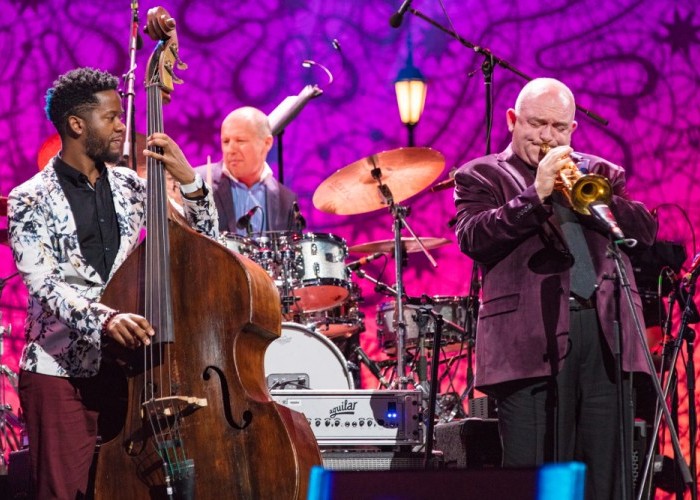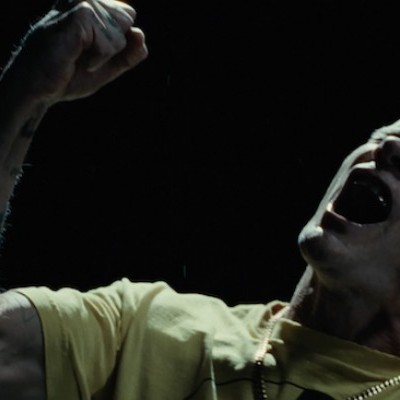Dec 9, 2025 12:28 PM
In Memoriam: Gordon Goodwin, 1954–2025
Gordon Goodwin, an award-winning saxophonist, pianist, bandleader, composer and arranger, died Dec. 8 in Los Angeles.…

Ben Williams (left), Oleg Butman and James Morrison perform in St. Petersburg, Russia, during the April 30 celebration of International Jazz Day.
(Photo: Steve Mundinger)Amplifying cultural exchange and diplomacy more than igniting heated sociopolitical debates has become an unspoken rule of International Jazz Day since the Thelonious Monk Institute of Jazz and UNESCO initiated the worldwide event in 2011.
Only part of that was true for 2018’s edition of the main event, held in St. Petersburg, Russia, on April 30. From an American perspective, especially considering the frequency with which jazz is equated with democracy, the decision of choosing St. Petersburg as the host city raised some eyebrows—perhaps even more—than last year when Havana, Cuba, hosted the gala concert.
The word “democracy” never was uttered during various speeches about the transformative, unifying, peace-making potency of jazz, and neither were “collusion” or “Chechnya.”
Before the concert began inside the Mariinsky Palace, Herbie Hancock, the event’s ambassador and co-artistic director, exalted, “April 30th has become known as the day where people of all ages, genders and ethnicities come together and prove that our similarities are stronger than our differences.”
Throughout the evening, and at several music workshops and panel discussions prior, the same message was echoed.
“The role of arts, the role of creation and especially of jazz, which has this tradition of bringing people together, is more important than ever in these challenging times,” said Audrey Azoulay, UNESCO’s director general, who succeeded Irina Bokova after a four-year term.
Azoulay’s new role at UNESCO coincided with an advisory committee considering bids and selecting St. Petersburg as this year’s host. The committee already has selected Sydney, Australia, for the celebration’s 2019 iteration.
Tenor saxophonist, and this year’s co-artistic director, Igor Butman expressed his interest in St. Petersburg being the host city since the event’s founding seven years ago.
“As soon as I saw that great vibe and atmosphere in Paris and at the first one, I thought that Russia should have this same kind of celebration of music, friendship, talent and respect for each other,” he said a few days before the festivities.
In November 2017, Butman spearheaded—with support by the Ministry of Culture of the Russian Federation—Jazz Across Borders, a jazz industry event with a mission to introduce the Russian jazz scene to the rest of the world. The two-day conference, in some ways, served as a prelude to this year’s International Jazz Day. The April 30 concert—which included musicians from the United States, Brazil, Germany, Mali, Israel, Japan, Panama, Cuba, Australia, China, Italy and Morocco—allowed several esteemed Russian talents, including Butman, to display their remarkable musicianship.
The Moscow Jazz Orchestra ably accompanied the Manhattan Transfer during its razzle-dazzle rendition of “Birdland;” pianist and vocalist Oleg Akkuratov sang a persuasive reading of “It Could Happen To You;” pianist and vocalist Natalia Smirnova shined during her take on “My One And Only Love”; violinist David Goloschekin offered a rapturous violin solo during Dianne Reeves’ majestic makeover of “In A Sentimental Mood;” and pianist Anatoly Kroll displayed his mastery of the Brazilian samba during Luciana Souza’s billowing performance of “Eu Vim Da Bahia.” Butman, though, is one of Russia’s biggest jazz stars and demonstrated why during his vigorous tenor saxophone solo on Herbie Hancock’s treatment of Stevie Wonder’s “You Got It Bad Girl.”
Like much of the discourse, the music was more congenial than confrontational. Under the direction of American pianist and composer John Beasley, the concert mostly kept it safe by focusing on apolitical material. It’s a move that some could argue was a bit jarring, given how much discussion has been focused on jazz’s diplomatic power and how it helped imbue African-Americans with a sense of dignity against the endless tide of oppressive racism. Sociopolitical classics by the likes of Sonny Rollins, John Coltrane, Max Roach, Abbey Lincoln, Nina Simone and Billie Holiday conspicuously were absent in favor of a sanguine arrangement of Oliver Nelson’s “Down By the River Side,” Victor Young’s “Stella By Starlight” and Frank Sinatra’s “Too Close For Comfort.” Even weeks after the 50th anniversary of Dr. Martin Luther King’s assassination, Hancock opted for his jazz-funk hit “Actual Proof,” instead of his classic homage to King, “I Have A Dream.”
Malian singer and guitarist Fatoumata Diawara, however, filled the void left by the recently departed South African trumpeter Hugh Masekela as one International Jazz Day musician inclined to perform pointed sociopolitical songs. Her surging performance of “Sowa,” a song touching on women’s rights and forced pregnancy, was a much-needed jolt in the concert. DB

Goodwin was one of the most acclaimed, successful and influential jazz musicians of his generation.
Dec 9, 2025 12:28 PM
Gordon Goodwin, an award-winning saxophonist, pianist, bandleader, composer and arranger, died Dec. 8 in Los Angeles.…

Belá Fleck during an interview with Fredrika Whitfield on CNN.
Jan 13, 2026 2:09 PM
The fallout from the renaming of the John F. Kennedy Center for the Performing Arts to include President Donald…

The success of Oregon’s first album, 1971’s Music Of Another Present Era, allowed Towner to establish a solo career.
Jan 19, 2026 5:02 PM
Ralph Towner, a guitarist and composer who blended multiple genres, including jazz — and throughout them all remained…

Flea has returned to his first instrument — the trumpet — and assembled a dream band of jazz musicians to record a new album.
Dec 2, 2025 2:01 AM
After a nearly five-decade career as one of his generation’s defining rock bassists, Flea has returned to his first…

Rico’s Anti-Microbial Instrument Swab
Jan 19, 2026 2:48 PM
With this year’s NAMM Show right around the corner, we can look forward to plenty of new and innovative instruments…